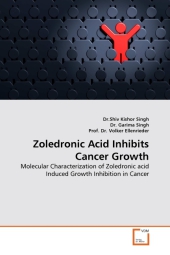 Neuerscheinungen 2011Stand: 2020-01-07 |
Schnellsuche
ISBN/Stichwort/Autor
|
Herderstraße 10
10625 Berlin
Tel.: 030 315 714 16
Fax 030 315 714 14
info@buchspektrum.de |

Volker Ellenrieder, Garima Singh, Shiv Kishor Singh
(Beteiligte)
Zoledronic Acid Inhibits Cancer Growth
Molecular Characterization of Zoledronic acid Induced Growth Inhibition in Cancer
2011. 120 S.
Verlag/Jahr: VDM VERLAG DR. MÜLLER 2011
ISBN: 3-639-36544-5 (3639365445)
Neue ISBN: 978-3-639-36544-3 (9783639365443)
Preis und Lieferzeit: Bitte klicken
The aminobisphosphonate zoledronic acid(ZOL) has elicited significant attention due to its remarkable anti-tumoral activity,though its detailed mechanism of action remains unclear. Here,we demonstrate the existence of a nuclear GSK3-NFATc2 stabilization pathway that promotes cancer growth in vitro and in vivo and serves as a bonafide target of ZOL. Specifically, the serine/threonine kinase GSK3 stabilizes nuclear NFATc2 through phosphorylation of the serine-rich SP2 domain, thus protecting the transcription factor from E3-ubiquitin ligase HDM2 mediated proteolysis. ZOL disrupts this NFATc2 stabilization pathway through two mechanisms, namely GSK3 inhibition and induction of HDM2 activity. Upon nuclear accumulation,HDM2 targets unphosphorylated NFATc2 for ubiquitination at acceptor lysine residues K-684/K-897 and hence labels the factor for subsequent proteasomal degradation. Conversely, mutagenesis induced constitutive serine phosphorylation of the SP2 domain prevents NFATc2 from HDM2 mediated ubiquitination and degradation by ZOL. In conclusion, this report demonstrates a critical role of the GSK3-HDM2 signaling loop in the regulation of NFATc2 protein stability.


